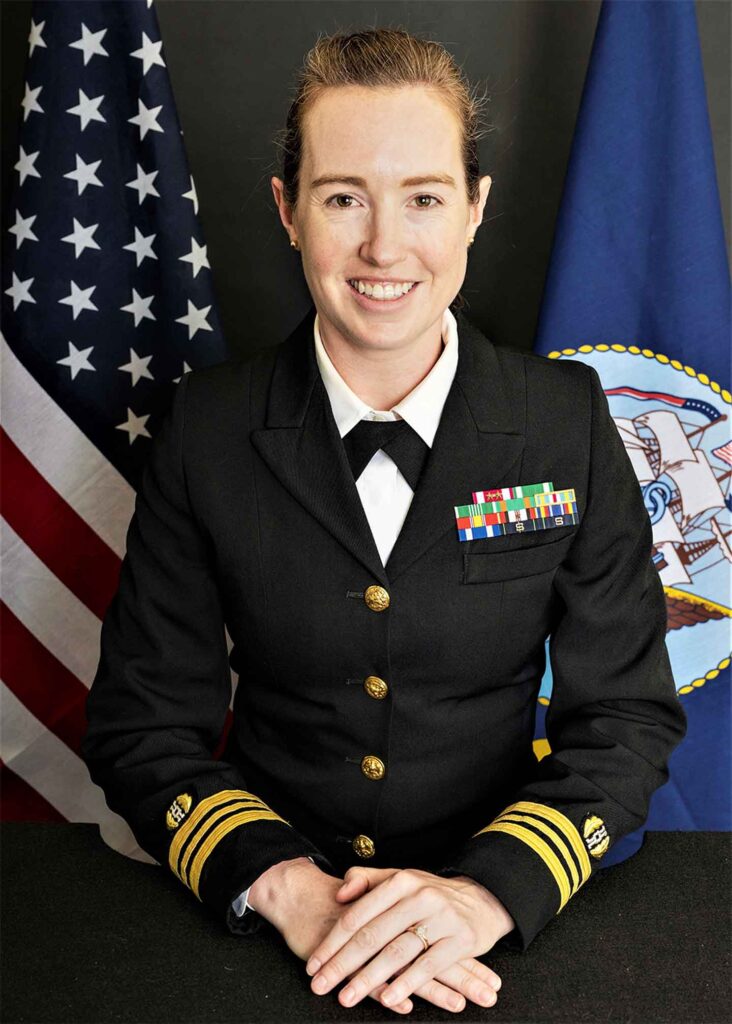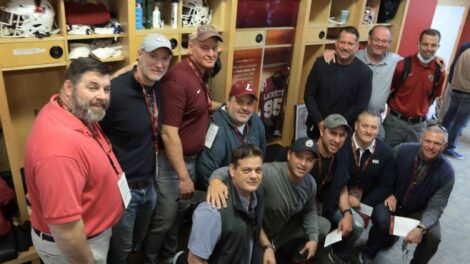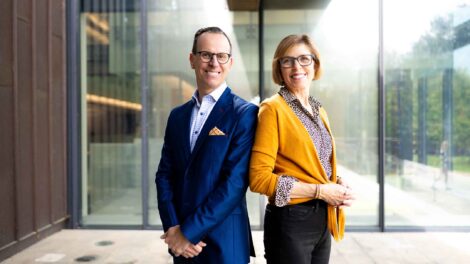Lauren Hugel Snyder ’06 shares how her Lafayette experience and her grandfather’s legacy, inspire her consistent giving
By Margaret Wilson

Lauren Hugel Snyder ’06 currently serves as as an officer in the U.S. Navy Judge Advocate General’s Corps in San Diego.
While Lauren Hugel Snyder ’06 was familiar with Lafayette her whole life, she didn’t always consider it a viable option for her college experience.
“My grandpa was probably one of the biggest proponents and advocates for Lafayette, and he passionately loved the school,” Snyder says. “I felt Lafayette was very much his thing, and I wanted to blaze my own trail.”
Her grandfather, Charles “Charley” Hugel ’51, joined the Lafayette Board of Trustees in 1977, where he served until being elected trustee emeritus after retiring in 1992. Hugel headed both The Campaign for Lafayette, concluding in 1985, and the Lafayette Leadership Campaign, in 1995, both of which raised millions for the College. Both Hugel Science Center and Hugel Welcome Center are named in honor of the generosity of Hugel and his wife, Nina. The couple also endowed the Cornelia F. Hugel Chair in History.
While Hugel was supportive of his granddaughter’s desire to forge her own path, he encouraged her to at least visit Lafayette. And as the story so often goes, she was hooked.
“I came, I did a tour, and I really fell in love with the campus and the academic opportunities,” Snyder says. “So I ended up saying, ‘Yeah, he was right.’”
Hugel, according to Snyder, pinpointed his Lafayette education as a critical defining factor in the trajectory of his life, due to a level of care and attention that opened doors. He hoped his granddaughter would be able to access the same opportunities.
Snyder did so, going on to play on the Lafayette volleyball team and becoming a government and law major with a minor in anthropology and sociology. She went on to University of Richmond School of Law, and today works as an officer in the U.S. Navy Judge Advocate General’s Corps in San Diego.
“Lafayette set me up for success. I think some of my peers [in law school] who came from other schools struggled, and it was a steep learning curve to keep up with the academic portion of it,” Snyder says. “It wasn’t a difficult academic transition for me because Lafayette challenges you and is a demanding academic setting. It gave me what I needed to be successful in law school and later as a judge advocate.”
It’s her experience at Lafayette, combined with the ethic of giving back instilled in her by her grandfather, that inspires Snyder and her family to be consistent supporters of the Lafayette College Fund.
“My grandpa and grandma really shaped who I am,” Snyder says. “Aside from his family, Lafayette was probably the most important thing to my grandpa, so it’s my way of honoring him and showing gratitude for the way he set me up and supported me in life, not just financially. He laid the groundwork for giving to Lafayette, and it’s a way for me to honor my grandparents while also contributing to something that I care personally about.”
Snyder finds contributing to the Lafayette College Fund allows her to make a difference while allowing those who are on the ground at the College to take the reins.
“I trust the College to spend the money well and direct it to the greatest need,” she says. “I trust the leaders that Lafayette selects, and I know we have an incredible team. I have no doubt that if I say, ‘Here’s what I have to give,’ it will be spent in the way that’s most impactful, meaningful, and necessary at this time.”

Lauren (second from left) still keeps in touch with classmates. Lauren is pictured with fellow alumnae at the Inn of the Anasazi: left to right: Alix Holstclaw ’06, Kristin Rhebergen ’06, Colleen Cardella ’06, and Kristan Dietz ’06.
Snyder points to Lafayette’s commitment to meeting 100 percent of demonstrated need and other financial aid initiatives as encouraging catalysts for her support.
“I want to be able to keep the College the way I remember it—small class sizes, the ability to pursue individual academic interests in partnership with a professor and I want Lafayette to be able to make a college education accessible to everybody, regardless of financial means, because it’s good for those individuals, and for the College as a whole.”
While her grandparents made extraordinary and lasting impacts on the College, Snyder underscores not everyone needs to reach that magnitude. To her, the contributions of young alumni at any level are just, if not more, important.
“For a lot of young alums, deep involvement with the College might not be something that is in the picture for them right now. But it doesn’t matter if it’s 25 or 200 or 10 dollars. Every little bit helps,” she says. “It unites us as alumni.”
While Snyder cites her friends from Lafayette who continue to be involved in the school as additional inspirations for her connectedness, it all comes back to the values instilled in her by her family.
“My grandpa really set an example for me in giving, and though I’ll never achieve the level of generosity he showed to Lafayette, it’s important to me to give consistently,” she says.
Now, over 70 years after her grandfather’s graduation, Snyder feels the same appreciation for Lafayette that Hugel did, embodying a spirit of philanthropy that lasts generations.
“I’m trying to follow in his footsteps and live up to the example that he set, and I know he’d be proud. I remain grateful to and acknowledge Lafayette for the way it shaped me.”



